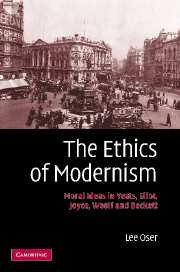Book contents
- Frontmatter
- Contents
- Acknowledgments
- Introduction: literature and human nature
- 1 W. B. Yeats: out of nature
- 2 T. S. Eliot: the modernist Aristotle
- 3 James Joyce: love among the skeptics
- 4 Virginia Woolf: Antigone triumphant
- 5 Samuel Beckett: humanity in ruins
- Conclusion: technology and technique
- Notes
- Works Cited
- Index
4 - Virginia Woolf: Antigone triumphant
Published online by Cambridge University Press: 22 September 2009
- Frontmatter
- Contents
- Acknowledgments
- Introduction: literature and human nature
- 1 W. B. Yeats: out of nature
- 2 T. S. Eliot: the modernist Aristotle
- 3 James Joyce: love among the skeptics
- 4 Virginia Woolf: Antigone triumphant
- 5 Samuel Beckett: humanity in ruins
- Conclusion: technology and technique
- Notes
- Works Cited
- Index
Summary
Woolf is the only English person under consideration in this book, so it is fitting here to take a moment to consider the English historical background of the ethics of modernism – a background that affected everyone else. In “Mr. Bennett and Mrs. Brown,” Woolf cites Samuel Butler's Way of All Flesh (written 1872–84, published 1903) as a herald of the “change in religion, conduct, politics, and literature” that she marks with the date December, 1910. The novel's hero, Ernest Pontifex, is born in 1835, the same year as Butler, and his unhappy experiences open up a brutally satirical perspective on Victorian morality. Ernest's very name is a jab at Thomas Arnold's ideal of earnestness. The narrator Overton, who is Ernest's godfather, describes the young man's puzzlement after the ruin of his ill-advised marriage:
What was morality worth if it was not that which on the whole brought a man peace at the last …? It seemed to [Ernest] that in his attempt to be moral he had been following a devil which had disguised itself as an angel of light. But if so, what ground was there on which a man might rest the sole of his foot and tread in reasonable safety?
Butler supplies his own version of the transvaluation of values: the “angel of light” is a “devil” in disguise. Blasting the hypocritical arrangements of marriage and family, he lays bare the meanness of respectability. His iconoclasm foreshadows Woolf's later attacks upon the Victorians.
- Type
- Chapter
- Information
- The Ethics of ModernismMoral Ideas in Yeats, Eliot, Joyce, Woolf and Beckett, pp. 85 - 101Publisher: Cambridge University PressPrint publication year: 2007



